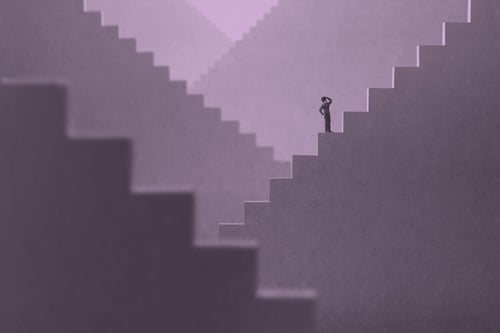The Pathway to Excellence | Work
Career Development
What is Career Development? Career development is how we bring meaning to the work we do by preparing and connecting the steps we take on The Pathway to Excellence. Our jobs, experience, and learning all help us to develop the character and competencies we need to thrive in our world. How we assemble the scope and sequence of what we do and the opportunities that are presented is all part of the process. We need to ensure that what we do forms a coherent narrative that aligns with who we are now and who we are becoming.

AN ATTITUDE FILLED WITH HOPE
Finding vocation in our career starts with our attitude. High achievers tend to be highly optimistic people; their attitude really shines through in all that they do. Optimism is all about having a positive outlook, maintaining a sense of humour, and developing long term hope. Hope without the promise of the outcome is your mark of excellence; it is one mark of our greatness in life, and in the life of a community. Hope is our passionate belief that we can and we must provide a better world for those around us. Hope, above all, must translate into action. Hope, faith and love should define our mission and daily life. It is with this same hope, faith and love that we should seek, each day of the year, to encourage and support faithfulness, hope and endurance in the hearts and minds of our community. Our careers, then, need to have more to do with our sense of vocation in our work: what we bring to benefit others as well as how we care for ourselves.
Bringing people, resources, vision and goals together to climb a mountain that we may not have climbed before can be exhilarating and, at the same time, frustrating. We often need hope along the way. If excellence, success, and victory were easy to achieve, we would all have it all of the time. Unfortunately, aspiration and realisation often only come together spasmodically throughout our lives. Nevertheless, we live in hope. Hope is different from confidence. Confidence is based more on knowledge, while hope is based on belief. We sometimes hear people say: “I cannot see the goal right now, so all I have is hope.” And so hope is a direct reflection of the strength of our faith: faith in ourselves, faith in those around us, faith in our values and faith in our God. And the opposite of hope, of course, is despair. Normally our goals are what inspire us, but not when we think they are impossible. If we lose all hope, we will never know whether we could have succeeded. All of us fight fear regularly. From time to time it gets the better of them, they become overly circumspect and start playing safe. Faith, hope, love, justice — these higher goals remind us that this is the only life we get so we need to build our careers inspired by this vision of vocation.
“When I walked out of prison, that was my mission, to liberate the oppressed and the oppressor both … The truth is that we are not yet free; we have merely achieved the freedom to be free … For to be free is … to live in a way that respects and enhances the freedom of others.”
Nelson Mandela
EMBRACING CHALLENGE AND PLAY
We need to have some fun in what we do and we need to feel rewarded for the efforts we put in. Part of this is, necessarily, material. We need to earn enough to make a life for us and those whom we love. Yet we also need intrinsic rewards to keep us happy and fulfilled in our work. We need to grow and we need some fun.
Individuals and teams grow through challenge. Challenge enables people to test themselves in new situations, to discover what they know and do not know, to determine how much they need to improve to achieve their goals. It is important that the challenges that are set are realistic. Build confidence and competence in stages by setting short-term targets that build towards a long-term goal. Make use of the strengths of those around you to help each other, and ensure that these strengths are stretched even further. There is no call here for selfish achievement of one’s own ends at the expense of others. Instead, there is a call to join in a community which shares in a culture of excellence and high standards. All of us have our part to play in helping each other become excellent in all that we attempt. Our strength as an individual is enhanced by those in our team, and we are diminished if someone else does poorly. We may not see it, but we are bound up together in our humanity.
A life of excellence is a lifetime of learning, reflection and curiosity. We need to search out people and environments where rigour and job satisfaction are equally valued and promoted. They’re is not always found in the most obvious places. We need to look hard and seek it in all of the corners of our present lives and beyond. Experiment, adventure, play and challenge serve to encourage curiosity and wonder from our youngest to our most senior. In many ways, it is the concept of “play” that nurtures our imagination and creativity, and playing around that enables us to put together ideas that haven’t been put together before. Exploring, messing around in the world, getting our hands dirty; all of these enabls us to make connections and see relationships that we would otherwise not have encountered. It gives us space to see things from different angles, freeing them from the tunnel vision of logical processing and thus freeing them for different ways of knowing. Embracing both challenge and play always involves managing risk, which can be problematic. When we are confronted by risk, we often shy away from creative and innovative thinking, which can lead to seemingly safe but out-dated and poor decisions. “Risk aversion” can also be encouraged by organisations that are conservative. On the other hand, some of us when confronted by risk blindly continue to escalate their commitment, holding fast to a poor choice until they end up “reinforcing defeat”. The key is for us all is to be consistent and realistic in the way we manage risk. A good decision is best, but even a bold but unsuccessful decision is better in many circumstances than no decision at all.
GROWING IN WISDOM TOGETHER
We need to become wiser to the ways in which our experience of the world unfolds. Knowing ourselves starts with understanding what we are good at and what we need to improve. It is essential to know what it is that we know and what we do not know, what we can do and what we cannot do, at any given point in time. Nonetheless, while our competencies change over time, our principles, values and prejudices define us more clearly than anything else. The closest we will come to knowing ourselves is to know our own values and the things that we care for most. When we understand the things that are at the core of our beliefs, then we need to fight passionately to defend them. They are our “hills to die for”. There is little else that is worth arguing about; peripheral things can be bypassed or compromised without compromising who we are. We do not need to make a stand every day over every little matter; happy people who feel confident about themselves know when to let go of an issue. We need to learn to judge what is necessary to protect our dignity, and then allow other people their dignity by giving ground and meeting their needs.
Making the change from being an occasional learner to someone dedicated to personal growth is tough. The change requires that we see ourselves clearly, we admit our flaws honestly, we seek to discover our strengths earnestly and we build upon our strengths passionately. We need to spend much more time working on our strengths and exploring new and untested areas of competency than we do trying to rectify weaknesses that may not necessarily be improved simply by sheer volume of effort. That of course doesn’t mean we can’t try to improve when we do poorly at something, but we need to learn to recognise in time that we can’t do it all and we certainly can’t do it all by ourselves. That’s where working together in community can help us all; we all rely on each other to fill in the gaps. Shared discipline also helps us all to do this. Discipline is a state of mind that produces appropriate, willing, and intelligent support for the work that needs to be done. The responsibilities of all members of our community and the need to achieve team goals demand discipline developed through competence, self-confidence, mutual trust and respect.
Experience will teaches us what works well for us and our team, and under what circumstances. We should not expect to get it right from the start. We need to study what has come before us. We can learn important lessons by imitating what we see in others, so long as we adapt it to the particular needs of our own situation. Most people begin by imitating mentors and role models. Over time, we can develop this into a style that is unique, one which “fits” us. And then we can spend the rest of our career learning how to express this authentic style even more effectively. We can also learn much by deliberately shying away from what we think have been poor examples of behaviour which we have seen in our own lives. When we do so, however, we need to make sure that we understand the reasons why we did not approve of this and ground this in a reflection on our values and the impact that the behaviour had.
We need to be careful also not to base our evaluation entirely on personality and tone. It is normal and natural for us to “like” people, and we do like to transfer these personal preferences over to our evaluation of how well they get the job done. It can also encourage us to surround ourselves with people who are similar in tone, personality and temperament to ourselves. This can actually weaken a team, as an effective team requires a wide variety of people with different skills, abilities and ways of thinking. This rarely comes from a group whose members all share the same basic personality type. What will bind a team together is not necessarily the initial attraction of team members to each other, but the shared experiences, especially in times of adversity. There is a saying that “the blade of a sword is only proved in fire”. Sometimes, this is very much true when we look at how communities form, grow and are sustained.
Many communities struggle, with varying degrees of success, to create a sense of unity amongst the range and diversity of people that inhabit them. It is one of those tasks that are never completed. Nevertheless, your community represents a high learning resource and serves as a reminder to all, that all of us develop significantly in our career development as a result of our dealings with members of our community. The Pathway to Excellence is usually best taken in company.
LOCATING OUR CAREER DEVELOPMENT IN OUR LIVES
In the end, we believe that everyone can learn and achieve success in a formal program of leadership development by:
- Building their career development program – how you manage your process of enrolment or entry into a specific program of career development and how you design it to match your best understanding about what you enjoy and what you are good at doing
- Adopting an approach to establishing and maintaining their career development progress – how you set and achieve goals in your career so you can grow in your character, competencies and wellness, while also attending to the practical requirements for looking after yourself and those who share your life
- Working through the best ways to boost their disposition towards career – how you make specific choices about what you will and will not do to build a career that enables you to attain a sense of belonging, achieve your potential and do what is good and right within the fields of your choice
- Locating the development of their careers with the scope and sequence of their work experience and internships – how you make the most of the opportunities presented to you for work within the context of what you will need to maximise your choices now and later in your life







